Ditapis dengan
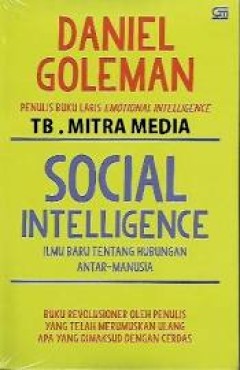
Social Intelligence: Ilmu Baru Tentang Hubungan Antar-Manusia
Daniel Goleman, penulis buku best-seller Emotional Intelligence, menyingkapkan bahwa kita manusia memang "tercipta untuk saling berhubungan". Dalam buku ini diungkapkan: + Bahwa otak kita sudah dirancang untuk saling berhubungan dengan otak orang lain secara terus-menerus tanpa henti. + Bagaimana cinta dan gairah saling memengaruhi satu sama lain. + Bagaimana mengenali emosi orang lain agar kit…
- Edisi
- Cetakan ke-4
- ISBN/ISSN
- 978-602-091993-3
- Deskripsi Fisik
- xxii + 534 hlm.; 23 cm.
- Judul Seri
- -
- No. Panggil
- 153.9 GOL s
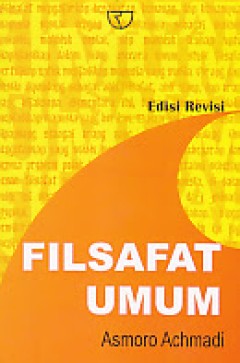
Filsafat Umum
Filsafat mengajarkan kesadaran, kemauan, dan kemampuan manusia sesuai dengan kedudukannya sebagai makhluk individu, makhluk sosial, dan makhluk Tuhan untuk diaplikasikan dalam hidup. Secara umum, studi filsafat bertujuan untuk menjadikan manusia yang susila. Orang yang susila dipandang sebagai ahli filsafat, ahli hidup, dan orang yang bijaksana. Sementara itu, tujuan khususnya adalah menjadik…
- Edisi
- Edisi Revisi, Cetakan ke-17
- ISBN/ISSN
- 978-979-421-447-3
- Deskripsi Fisik
- x + 142 hlm.; 21 cm.
- Judul Seri
- -
- No. Panggil
- 100 ACH f
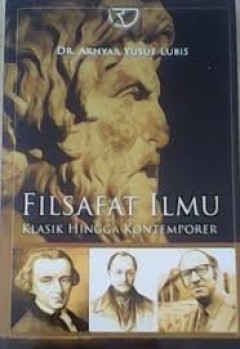
Filsafat Ilmu: Klasik Hingga Kontemporer
Salah satu cabang utama filsafat adalah filsafat ilmu (epistemologi). Pada cabang ini, pertanyaan-pertanyaan yang muncul dan dicoba dijawab oleh para filsuf adalah apakah pengetahuan itu? Darimanakah sumber pengetahuan itu? Bagaimanakah manusia mengetahui? Apakah pengetahuan yang diperoleh manusia itu bersifat murni, netral ataukah tidak terlepas dari asum…
- Edisi
- Cetakan ke-4
- ISBN/ISSN
- 978-979-769-686-3
- Deskripsi Fisik
- xiv + 266 hlm.; ils.; 24 cm.
- Judul Seri
- -
- No. Panggil
- 100 LUB f
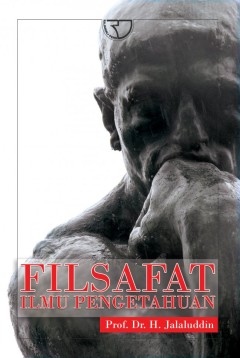
Filsafat Ilmu Pengetahuan: Filsafat, Ilmu Pengetahuan dan Peradaban
Gerakan pemikiran ilmiah ternyata tidak sekali jadi. Langsung terwujud layaknya “menggosok lampu Aladin”. Prosesnya berlangsung di rangkaian perjalanan yang cukup panjang. Terus berlanjut tanpa henti. Ibarat rangkaian mata rantai, tetap berkesinambungan dari kurun waktu ke kurun waktu berikutnya. Berlangsung terus selama berbilang abad. Memang di rentang perjalanan itu, acapkali pula t…
- Edisi
- Cetakan ke-2
- ISBN/ISSN
- 978-979-769-537-8
- Deskripsi Fisik
- xvi + 348 hlm.; 23 cm.
- Judul Seri
- -
- No. Panggil
- 121 JAL f

Etika Keduniawian: Karakter Etis Pemikiran Politik Hannah Arendt
- Edisi
- Cetakan ke-1
- ISBN/ISSN
- -
- Deskripsi Fisik
- 123 hlm.; 20 cm.
- Judul Seri
- -
- No. Panggil
- 170 KOT e
- Edisi
- Cetakan ke-1
- ISBN/ISSN
- -
- Deskripsi Fisik
- 123 hlm.; 20 cm.
- Judul Seri
- -
- No. Panggil
- 170 KOT e
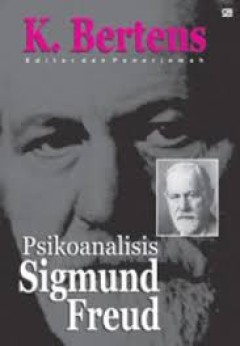
Psikoanalisis Sigmund Freud
Sigmund Freud adalah nama besar yang telah meninggalkan jejak-jejak pemikirannya pada kultur modern kita. Majalah Time tiga kali meliput dokter dari Austria itu sebagai cover story pada 1924, 1939 (tahun kematiannya), dan 1993. Bahkan, menjelang pergantian abad, majalah tersebut menobatkannya sebagai satu dari seratus tokoh yang paling berpengaruh sepanjang abad ke-20. Pengaruh itu terus ber…
- Edisi
- Cetakan ke-1
- ISBN/ISSN
- -
- Deskripsi Fisik
- viii + 267 hlm.; 24 cm.
- Judul Seri
- -
- No. Panggil
- 150.1952 BER p
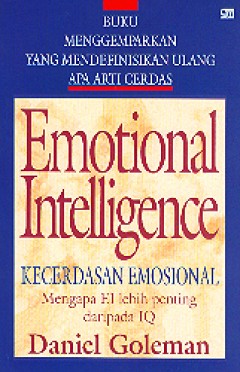
Emotional Intelligence = Kecerdasan Emosional : Mengapa EI Lebih Penting dari IQ
Melalui contoh-contoh yang hidup, dalam buku ini Goleman melukiskan ketrampilan kecerdasaan emosional yang harus dimiliki dan bagaimana ketrampilan itu menentukan keberhasilan dalam semua aspek kehidupan: perkawinan, persahabatan dan karier. Yang paling penting adalah Goleman menunjukkan bagaimana kecerdasan emosional dapat diperoleh dan diperkuat dalam diri kita. Emotional Intellegence dapat m…
- Edisi
- -
- ISBN/ISSN
- 9796054086
- Deskripsi Fisik
- xvi + 497 hlm.; 23,5 cm.
- Judul Seri
- -
- No. Panggil
- 159.9 GOL e

Chicken Soup for the Soul: Kekuatan Berpikir Positif. 100 Kisah Inspiratif te…
Buku ini mengajak pembaca untuk memandang kehidupan dan semua permasalahannya dengan sudut pandang positif. Ketika kita bersikap dan berpikir secara positif, semua permasalahan akan tampak lebih mudah dihadapi. Bahkan, itu akan membuat semangat hidup kita semakin kuat, dan kita dipenuhi rasa syukur dan bahagia karena telah berhasil melaluinya. Buktikan semua kehebatan bersikap dan berpikir p…
- Edisi
- Cetakan ke-10
- ISBN/ISSN
- 978-602-03-0746-6
- Deskripsi Fisik
- x + 484 hlm.; 20 cm.
- Judul Seri
- -
- No. Panggil
- 153.42 CAN c
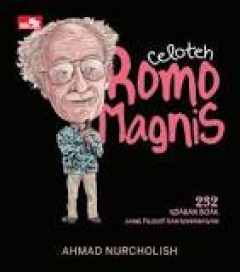
Celoteh Romo Magnis: 232 Ujaran Bijak Sang Filosof dan Rohaniwan
Franz Magnis Suseno, Pastor Katolik yang kini berusia 81 tahun ini memiliki pergaulan sangat luas. Pengajar di Sekolah Tinggi Filsafat (STF) Driyarkara Jakarta ini, dapat kita sejajarkan dengan Gus Dur, Cak Nur (Nurcholish Madjid), Buya Syafi’I Ma’arif, Pdt. A. A Yewangoe, serta tokoh-tokoh lain yang secara konsisten merawat kebinekaan bangsa dan senantiasa berupaya bagi terwujudnya kehidup…
- Edisi
- Cetakan ke-1
- ISBN/ISSN
- 978-602-04-5365-1
- Deskripsi Fisik
- xvi + 243 hlm.; 17 cm.
- Judul Seri
- -
- No. Panggil
- 181.16 NUR c

Metodologi Riset Studi Filsafat Teologi
- Edisi
- Cetakan ke-1
- ISBN/ISSN
- 978-602-5765-61-2
- Deskripsi Fisik
- x + 424 hlm.; ils.; 20,5 cm.
- Judul Seri
- -
- No. Panggil
- 101.01 MET m
- Edisi
- Cetakan ke-1
- ISBN/ISSN
- 978-602-5765-61-2
- Deskripsi Fisik
- x + 424 hlm.; ils.; 20,5 cm.
- Judul Seri
- -
- No. Panggil
- 101.01 MET m
 Karya Umum
Karya Umum  Filsafat
Filsafat  Agama
Agama  Ilmu-ilmu Sosial
Ilmu-ilmu Sosial  Bahasa
Bahasa  Ilmu-ilmu Murni
Ilmu-ilmu Murni  Ilmu-ilmu Terapan
Ilmu-ilmu Terapan  Kesenian, Hiburan, dan Olahraga
Kesenian, Hiburan, dan Olahraga  Kesusastraan
Kesusastraan  Geografi dan Sejarah
Geografi dan Sejarah